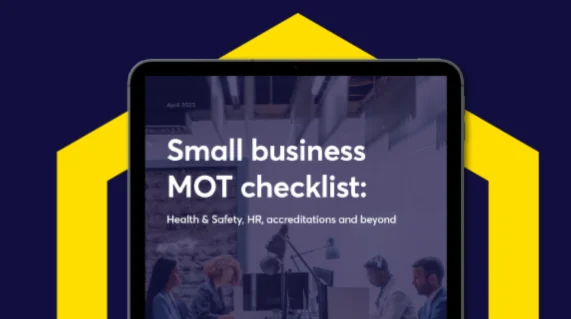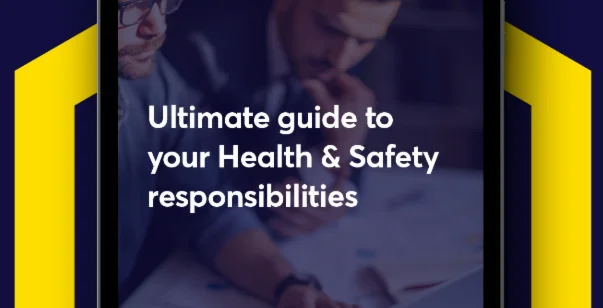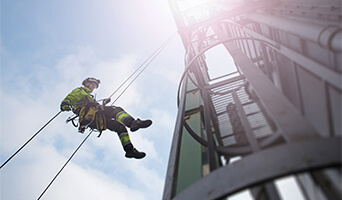Appointing a risk assessment manager is a crucial part of ensuring workplace safety and compliance with legal requirements. In this blog, we’ll outline who should be responsible for the completion of risk assessments and what the responsibilities of a risk assessment manager are.
Who is responsible for risk assessments?
If you are an employer or self-employed, you must carry out a risk assessment within the workplace or appoint an appropriate person with the necessary skills, experience and knowledge. Employers have the option to choose someone within their organisation to oversee and carry out these assessments while making sure all legal duties are met.
As outlined in the Management of Health and Safety at Work Regulations 1999, this individual must be a “competent person”. Steps must be taken to ensure “the effective planning, organisation, control, monitoring and review of preventive and protective measures”.
Should you choose to delegate the responsibility of the risk assessment to somebody who fits this criteria, the responsibility still sits with you to ensure all due diligence is carried out properly.
Choosing your risk assessment manager
Your chosen risk assessment manager will play an important part in keeping your work environment safe and compliant, and their job will be to identify and evaluate potential risks, implement control measures and keep a record of all assessments conducted.
When it comes to picking your risk assessment manager, you have three main options:
- Yourself – as the employer, you can take on the role of the risk assessment manager if you have the necessary qualifications and training.
- Somebody else in the business – you can choose an existing employee or multiple employees within your organisation to manage risk assessments, provided they meet the competency criteria.
- Somebody external – another option is to hire an external consultant or service specializing in risk assessment to oversee the process. This is a viable choice, particularly for smaller businesses that may not have the in-house expertise.
Why is a risk assessment needed?
Regardless of the industry or workplace setting, managing hazards and risks effectively is essential. Asking an employee to carry out a task without any prior understanding of associated risks can be unsafe, and it can bring legal complications should a person incur an injury if working practices are not met.
A risk assessment is a document that helps to control and reduce the risk for the person(s) carrying out the required work. It’s important that there is sufficient detail and information contained within the assessment to communicate the salient points clearly.
If you appoint a risk assessment manager, then consider the expertise and knowledge of the person you select. The size and structure of your business may inform how this is decided. If you’re a smaller business and the type of work carried out is restricted to a particular area, then the knowledge gaps. However, larger businesses may need to analyse the effectiveness of assigning one person to oversee the entire risk assessment process.
Knowing how to write a risk assessment is important, as the risk assessment will only be effective if written properly. Without the correct details documented, the safety of employees may be compromised, and your business runs the risk of failing to be compliant with legal standards.
Should a risk assessment manager have qualifications and training?
You wouldn’t assign somebody to carry out a manual task without the requisite training and experience, and the same applies to risk assessments. Picking the right person for the role is essential, and you’ll need to consider their training and qualifications. Let’s explore these crucial factors in detail.
Qualifications
Your risk assessment manager should have the necessary qualifications to effectively carry out their duties. These qualifications could typically include relevant certifications, such as NEBOSH (National Examination Board in Occupational Safety and Health) or a similar recognised qualification.
Training
As well as qualifications, your chosen risk assessment manager should have gone through proper training in risk assessment methodologies. They should have knowledge of any specific requirements within your industry and have a proper understanding of how to identify, evaluate, and mitigate risks effectively.
Get Risk Assessment Advice from HS Direct
At HS Direct, we understand just how important effective risk assessments are when it comes to keeping your workplace safe and compliant. Our services can help you choose the right competent person, provide guidance on qualifications and training, and ensure that your risk assessments are carried out effectively.
We have a wide range of risk assessment templates for just about every industry. If you’d like to create a tailored document to benefit your business, then our blank risk assessment template is simple and easy to use.
We also have a free to download our free risk assessment template. Our guide to risk assessments also provides an in-depth look at the benefits they provide to improve Health and Safety and demonstrate compliance for your business.
To speak to a member of the team about risk assessments or your business needs, just call 0114 244 4461 or visit our contact page. We’re by your side to make your life easier when it comes to managing workplace safety and compliance. If you’d like to explore the topic more, then why not take a look at our guide to risk assessments?









